Man who sold export reject shirts on footpath now owns Rs 60 crore turnover business empire

25-June-2016
Vol 7 | Issue 26
The story of Bengaluru-based entrepreneur Raja Nayak reads like a movie script, where the hero, hailing from a poor background, dreams of making it big, and one day becomes a millionaire.
A Class 10 dropout, Raja, who was born in a poor Dalit family, fought his way up to reach the position where he is now - a successful entrepreneur owning several businesses and educational institutions, and clocking a turnover of Rs. 60 crore in all.
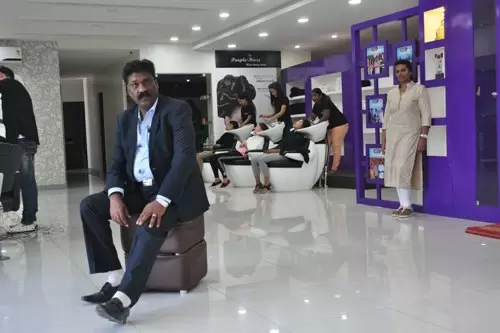 |
|
Raja Nayak started his business with Rs 5,000 along with a friend and began selling export reject shirts on the footpath. Today he owns multiple businesses (Photos: H K Rajashekar)
|
From selling export reject shirts on the footpath at the age of 16 to setting up his latest venture NutriPlanet Foods - a company that is into super food and advanced nutrition products - life’s been a wonderful roller coaster ride for this compulsive multitasker.
“Luck has favoured me in every venture I took a plunge into. I encashed every opportunity that came my way,” says the 55-year-old entrepreneur, a diehard fan of Bollywood superstar Amitabh Bachchan.
Raja was so much inspired by the actor’s 1978 film ‘Trishul’ - where a penniless Amitabh goes on to become a real estate baron - that he ventured into the real estate business and struck gold there.
Now he owns multiple businesses. Akshay Enterprises is into manufacturing of corrugated boxes, MCS Logistics International is into shipping and logistics, and Jala Beverages deals with packaged drinking water.
To fulfil his wife Anita’s dreams, Raja also ventured into the wellness space by opening a chain of unisex salon-cum-spas under the brand name Purple Haze.
“With my three sons taking active part in the other businesses, I am currently focusing on NutriPlanet Foods.
“We work closely with CSIR-CFTRI (Council of Scientific and Industrial Research - Central Food Technological Research Institute) and make products like energy bars, gels, paste and oil using White Chia seeds,” says Raja.
Eighty per cent of their total turnover comes from MCS Logistics and Akshay Enterprises, he adds.
Raja also runs KJ High School for underprivileged children, and a nursing and B.Ed college. Years ago, he had vowed to start a school of his own after one of the schools in the city had denied a seat for his sister.
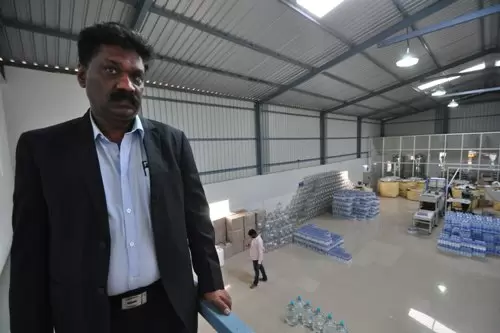 |
|
Raja has reached a fairly high position, but he is still growing and has new projects in the pipeline
|
In 1976, when he had saved enough money, he rented a small house, hired a few teachers and started a nursery school. That school has now grown into a high school and 600 students are studying in it.
There is an interesting backstory to Jala Beverages as well. Three years ago, Raja read a newspaper article about discrimination of Dalits at a hotel in a village in Bagalkot district of North Karnataka.
Drinking water was not served in tumblers to Dalits, but was poured into their hands. He visited the village and saw with his own eyes how Dalits were being treated as untouchables and outcasts.
“That day I made up my mind to set up a drinking water bottling plant. When people buy our water bottles, would they check whether the owner is a Dalit,” he reasons.
Eldest of five siblings, Raja’s childhood was mired in poverty. “My father did not take responsibility of the family. With his meagre earnings, it was difficult to get even one good meal a day for a family of seven.
“Unable to pay the school fees on time, I remember being made to stand outside the class very often. My mother, who was a housewife, would often pawn whatever little jewellery she had to pay our school fees and make ends meet.
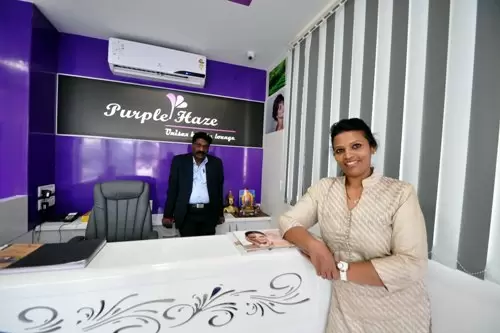 |
|
Anita, Raja's wife takes care of Purple Haze, a chain of salon-cum-spas in Bengaluru
|
“There were days when I used to just take a stroll outside the school premises during lunch break, because I had no lunch to eat,” he adds.
The entrepreneurial bug bit Raja at an early age of 16. After flunking the tenth board exam, Raja killed time with his childhood friend Deepak, a Punjabi, who was also a class ten drop out like him.
“We both lived in the same street. Once, one of Deepak’s uncles persuaded us to do something constructive instead of wasting our time. That’s when I and Deepak ran away from home to try our luck in the garments business,” recalls Raja.
Raja recounts their memorable escapade to Chennai with about Rs 10,000 in hand, an equally shared capital.
“I took all the money my mother had saved in the spices box in the kitchen. We picked up the export reject shirts with the money from Chennai and returned to Bengaluru,” recalls Raja.
Since their stock comprised 80 per cent blue shirts, they decided to sell it on the footpath near the MICO factory, targeting MICO employees who wore blue uniform shirts to work.
“We sold the entire stock the very first day and made a profit of Rs. 5,000. We were so ecstatic to see the huge profit. Not losing much time, we took a bus to Tiruppur (a major garments hub in Tamil Nadu) the same night.
“We found that export rejects and surplus garments were sold for Rs. 30 to 40 per kilogram at the night market there on Tuesdays.
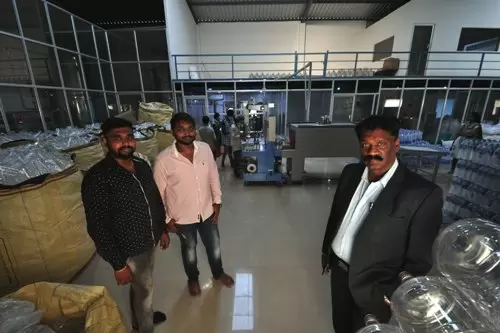 |
|
With his sons getting more involved in the business, Raja is looking at new opportunities
|
“We started buying shirts and under garments from Tiruppur and selling it in Bengaluru for good profit. This went on successfully for a couple of years,” he reminisces.
Having tasted success in his maiden venture, Raja made bigger plans. His education in an English medium school helped him to speak to people in fluent English.
From footpath, the duo started selling the garments on a cart and then in halls, where exhibitions were held. “We did reasonably well in this business for four to five years,” says Raja.
From garments, they moved on to selling Kolhapuri chappals. “We would bring Kolhapuri chappals from wholesale makers at Rs. 40 to 50 a pair, and sell it to a shop on Brigade Road for Rs. 100.
“Lady Luck smiled on us in this business too and we made good money.”
Later, the friends opened a restaurant in Koramangala called ‘Tawa’ in the 80’s that served authentic Punjabi roti and curry.
“We ran the hotel successfully for three years and sold it to one of Deepak's relatives. Tawa was the last partnership with Deepak,” says Raja.
Around 1991, Raja started Akshay Enterprises with another partner. Later he joined MCS Logistics as one of the directors. Today, he is Managing Director of MCS Logistic International Pvt. Ltd.
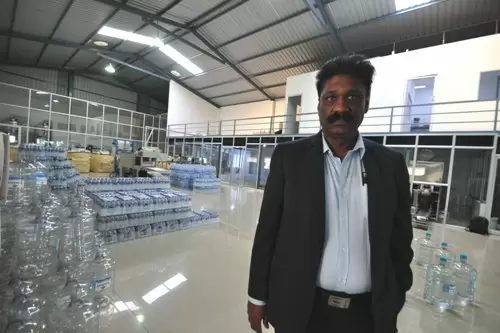 |
|
Jala Beverages, the drinking water bottling plant, was started with a social motive
|
Raja, who works for the welfare of fellow Dalits and inspires them to become entrepreneurs, is also the President of the Karnataka chapter of Dalit Indian Chamber of Commerce and Industries (DICCI).
“At DICCI, we are working hard to make aware the advantages and facilities of various government schemes, which help anybody with a dream and vision to become an entrepreneur,” says Raja.
Raja is also closely connected with the central government’s ‘Stand up India’ scheme which is intended to support entrepreneurship among women and SC & ST communities.
“From job seekers, I want Dalits to become job givers,” says Raja, who has more new projects in the pipeline.
You might also like
From push cart biryani vendor to founder of Rs 70 crore turnover biryani food chain














